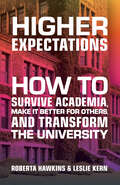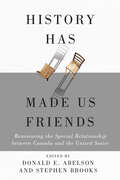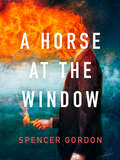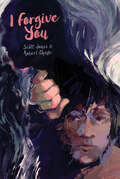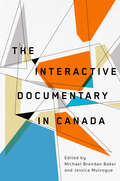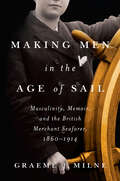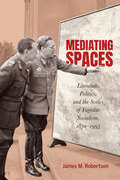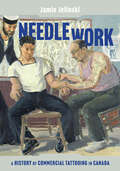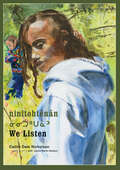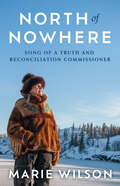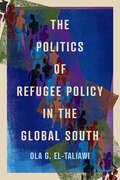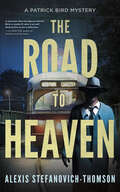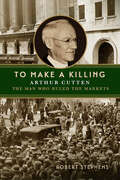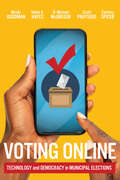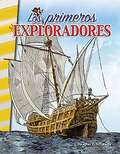- Table View
- List View
Higher Expectations: How to Survive Academia, Make it Better for Others, and Transform the University
by Leslie Kern Roberta HawkinsHigher Expectations is a practical guide to navigating academia for people who want to improve their own day-to-day work lives and create better conditions for everyone. Universities are broken: they’re built on systems that are discriminatory, hierarchical, and individualistic. This hurts the people that work and learn in them and limits the potential for universities to contribute to a better world. But we can raise our expectations. Hawkins and Kern envision a university transformed by collaboration, care, equity, justice, and multiple knowledges. Drawing on real-world, international examples where people and institutions are already doing things in new ways, Higher Expectations offers concrete advice on how to make these transformations real. It covers many areas of academic life including course design, conferencing, administration, research teams, managing workloads and more. Designed for faculty, graduate students, postdoctoral researchers, and other scholars, Higher Expectations delivers hope and practical actions you can take to start making change now. It is a must-have for everyone working in academia today.
History Has Made Us Friends: Reassessing the Special Relationship between Canada and the United States
by Donald E. Abelson and Stephen BrooksSeparated by the world’s longest land border and engaging in over three billion dollars in trade daily, Canada and the United States share security concerns, cultural interests, and a history spanning more than 250 years. Alan Rock, former Canadian ambassador to the United States, has said that this special relationship represents “a bond that is beyond practical. It borders on mystical.” The rise of nativist sentiment, however, has raised concerns over preserving this relationship.History Has Made Us Friends illuminates the nature and dynamics of Canada-US relations, examining their history, attributed meaning, and conceptualization. Contributors consider many angles and perspectives, including the impact of geopolitical change, to determine whether the relationship warrants the moniker “special.” They explore whether shared values and demographic similarities continue to cement the relationship, and if it still matters whether presidents and prime ministers get along.While things look different today from when President Kennedy declared, “What unites us is far greater than what divides us,” History Has Made Us Friends argues that the Canada-US relationship – often narrowly understood or dismissed as a relic of the past – continues to be unique and resilient.
A Horse at the Window
by Spencer GordonA genre-bending collection of dramatic monologues shining a light on the anxious, self-directed gaze that defines contemporary consciousness. Borrowing stylistic elements from the prose poem, faux memoir, online diatribe, and philosophical investigation, the twenty-five dramatic monologues in Spencer Gordon’s genre-bending collection shine a light on the anxious, self-directed gaze that defines contemporary consciousness. CEOs lose their obscene wealth in lurid hellrealms; an aspiring writer reassembles a personal history out of fragments from the 2000s; police cadets receive a curious crash course in transduction and ethics; the Great Pacific Garbage Patch and Deepwater Horizon oil spill reveal the immanent sublime. Ranging from ironic and furious to pleading and melancholic, Gordon’s speakers exist in a world of social media think pieces, hot takes and take downs, fake news and distorted facts, steeped in pop culture and its discontents. They are real people, intimate as kin. But they’re also pseudonyms, ghosts, and playbacks, echoing from insubstantial handles drifting on the web. They lie and lurk and love online, channelling the morphemes of digital language and filtering the concerns of self, performance, digital identity, and complicity through the irreverence, non-rationality, and surprising beauty of Zen.
I Forgive You
by Scott Jones Robert ChafeFirst produced by Artistic Fraud at Arts and Culture Centre, St. John’s, in August 2022
The Interactive Documentary in Canada
by Michael Brendan Baker and Jessica MulvogueInteractive documentary emerged rapidly from a constellation of changing technologies and practices to much excitement, yet its history is short and its future uncertain. In the mid-2010s Canada was a world leader in the creation of i-docs. Less than a decade later technological obsolescence has rendered many of these celebrated projects inaccessible, while rapid digital innovation continues to change the i-doc form and its modes of experience.The Interactive Documentary in Canada captures this transitional moment in documentary filmmaking and media production. Bringing together a range of historical, theoretical, and critical approaches, this collection examines the past – and the imagined future – of a nonfiction storytelling phenomenon that has Canadian institutions, figures, and works at its centre. Embracing a polyphonic conception of interactive documentary, the volume includes explorations of web-based, app-based, installation, and virtual reality works that push the boundaries of what is understood as documentary cinema. Leading documentary scholars and makers consider the historical and technological contexts of i-doc production, innovation, and exhibition; the political and pedagogical potential of the genre; the ethics of the i‐doc experience; and the format’s future lifespan in the contemporary media landscape.The Interactive Documentary in Canada establishes a place for the i-doc in the history of Canadian film, highlighting the genre’s significant impact on the National Film Board of Canada and on contemporary global documentary media.
Kiss the Undertow: A Novel
by Marie-Hélène LarochelleThe water slurps my shoulders, torso, and back in a big, wet kiss, bending my image into an ironic clone of the truth. I bow to its dominance and let it break me open. The water alone will have me. Watched obsessively by her guru-like coach, a nameless swimmer battles the element of water in a gruelling physical regimen. Outside of training, she floats loose in waters murky, salty, and chlorinated, engaging in aimless self-destruction, restraint looming just beyond her drifting hand. Incrementally, swimming is killing her; the pool is killing her. Hovering always nearby is a prickly vulture, waiting to feed on the swimmer’s remains … Intense and immersive, Kiss the Undertow is a psychologically gripping account of endurance pushed to extremes.
Making Men in the Age of Sail: Masculinity, Memoir, and the British Merchant Seafarer, 1860–1914
by Graeme J. MilneMyths and stereotypes surrounding seafarers in the Age of Sail persist to this day. Sailors were celebrated for their courage, strength, and skill, yet condemned for militancy, vice, and fecklessness. As sail gave way to steam, sailing-ship mariners became nostalgic symbols of maritime prowess and heritage, representing a timeless, heroic masculinity in an era when the modernizing industrial world was challenging assumptions about gender, class, work, and society.Drawing on British seafaring memoirs from the late nineteenth century, Making Men in the Age of Sail argues that maritime writing moulded the reading public’s image of the merchant seaman. Authors chronicled their lives as they grew from boy sailors to trained seafarers, telling colourful tales of the men they worked with – most never doubted that the sailing ship had made them better men. Their testimony reinforced and preserved conservative perspectives on seafaring manhood as Britain’s economic and technological priorities continued to evolve in the new steamship age.Offering a gender analysis of the image of the seafarer, Making Men in the Age of Sail brings the history of British sailors into wider debates about modernity and masculinity.
Mediating Spaces: Literature, Politics, and the Scales of Yugoslav Socialism, 1870–1995
by James M. RobertsonThroughout the twentieth century in the lands of Yugoslavia, socialists embarked on multiple projects of supranational unification. Sensitive to the vulnerability of small nations in a world of great powers, they pursued political sovereignty, economic development, and cultural modernization at a scale between the national and the global – from regional strategies of Balkan federalism to continental visions of European integration to the internationalist ambitions of the Non-Aligned Movement.In Mediating Spaces James Robertson offers an intellectual history of the diverse supranational politics of Yugoslav socialism, beginning with its birth in the 1870s and concluding with its violent collapse in the 1990s. Showcasing the ways in which socialists in Southeast Europe confronted the political, economic, and cultural dimensions of globalization, the book frames the evolution of supranational politics as a response to the shifting dynamics of global economic and geopolitical competition. Arguing that literature was a crucial vehicle for imagining new communities beyond the nation, Robertson analyzes the manuscripts, journals, and personal correspondence of the literary left to excavate the cultural geographies that animated Yugoslav socialism and its supranational horizons. The book ultimately illuminates the innovative strategies of cultural development used by socialist writers to challenge global asymmetries of power and prestige.Mediating Spaces reveals the full significance of supranationalism in the history of socialist thought, recovering a key concern for an era of renewed geopolitical contestation in Eastern Europe.
Needle Work: A History of Commercial Tattooing in Canada (McGill-Queen's/Beaverbrook Canadian Foundation Studies in Art History #44)
by Jamie JelinskiIn 1891 J. Murakami travelled from Japan, via San Francisco, to Vancouver Island and began working in and around Victoria. His occupation: creating permanent images on the skin of paying clients.From this early example of tattooing as work, Jamie Jelinski takes us from coast to coast with detours to the United States, England, and Japan as he traces the evolution of commercial tattooing in Canada over more than one hundred years. Needle Work offers insight into how tattoo artists navigated regulation, the types of spaces they worked in, and the dynamic relationship between the images they tattooed on customers and other forms of visual culture and artistic enterprise. Merging biographical narratives with an examination of tattooing’s place within wider society, Jelinski reveals how these commercial image makers bridged conventional gaps between cultural production and practical, for-profit work, thereby establishing tattooing as a legitimate career.Richly illustrated and drawing on archives, print media, and objects held in institutions and private collections across Canada and beyond, Needle Work provides a timely understanding of a vocation that is now familiar but whose intricate history has rarely been considered.
ninitohtênân / We Listen (Nohkom series #3)
by Caitlin Dale NicholsonThe third book in the Nôhkom series, in Cree and English, tells a story about gathering leaves for Labrador tea, while listening in different ways. A child, her family and her friend have arrived at their favorite picnic spot by the lake, but before they eat lunch Nôhkom suggests they pick leaves for Labrador tea. Once among the trees, Nôhkom pauses for a moment to listen, and the others do too. Nôhkom prays, the girls take their turn, then Nôhkom shows them where to find the leaves. Nôhkom and Mom rest after harvesting, but the girls opt for a swim in the lake ... though they’re quite happy to warm up afterwards with freshly brewed Labrador tea. And when it’s time for the picnic, the girls take another turn at listening. Beautifully rendered paintings in acrylic on canvas show the family outing. Includes a recipe for Labrador tea as well as a salve made from Labrador Tea leaves. Key Text Features illustrations recipe informational note Correlates to the Common Core State Standards in English Language Arts: CCSS.ELA-LITERACY.RL.1.2 Retell stories, including key details, and demonstrate understanding of their central message or lesson. CCSS.ELA-LITERACY.RL.1.7 Use illustrations and details in a story to describe its characters, setting, or events.
North of Nowhere: Song of a Truth and Reconciliation Commissioner
by Marie WilsonThe incomparable first-hand account of the historic Truth and Reconciliation Commission of Canada told by one of the commissioners who led it. The Truth and Reconciliation Commission was established to record the previously hidden history of more than a century of forced residential schooling for Indigenous children. Marie Wilson helped lead that work as one of just three commissioners. With the skills of a journalist, the heart of a mother and grandmother, and the insights of a life as the spouse of a residential school survivor, Commissioner Wilson guides readers through her years witnessing survivor testimony across the country, providing her unique perspective on the personal toll and enduring public value of the commission. In this unparalleled account, she honours the voices of survivors who have called Canada to attention, determined to heal, reclaim, and thrive. Part vital public documentary, part probing memoir, North of Nowhere breathes fresh air into the possibilities of reconciliation amid the persistent legacy of residential schools. It is a call to everyone to view the important and continuing work of reconciliation not as an obligation but as a gift.
Out Here: Governor Sir Humphrey Walwyn’s Quarterly Reports from Newfoundland, 1936–1946
by Melvin Baker and Peter NearyVice Admiral Sir Humphrey Thomas Walwyn (1879–1957) was the British-appointed governor of Newfoundland from 1936 to 1946 – a period of remarkable change that would culminate in Newfoundland’s union with Canada in 1949. Assembling records from the British national archives and the provincial archives in Newfoundland and Labrador, Out Here presents readers with Walwyn’s quarterly reports to the secretary of state for dominion affairs in London throughout his tenure as governor.Walwyn’s position offered him a unique vantage point on the political and economic situation in Newfoundland throughout this tumultuous period. His reports bear witness to profound change, chronicling the economic downturn experienced in the final years of the Great Depression, followed by the unprecedented prosperity sparked by the Second World War that set the stage for debates over governance and for significant constitutional advance. The detailed accounts of Walwyn’s daily life in Newfoundland feature rich descriptions of capital city, company town, and outport mores; they paint a picture of coastal life in the mid-twentieth century and introduce the wide array of characters the governor encountered.Throughout, the candid insider accounts of Governor Walwyn are augmented by expert historical context and illustrated with a generous selection of contemporary photographs. As a whole, Out Here stands as an invaluable primary-source record and an important trove of information on wartime experiences in Atlantic Canada.
Pharmacopoeias, Drug Regulation, and Empires: Making Medicines Official in Britain’s Imperial World, 1618–1968 (Intoxicating Histories #10)
by Stuart AndersonThe word "pharmacopoeia" has come to have many meanings, although it is commonly understood to be a book describing approved compositions and standards for drugs. In 1813 the Royal College of Physicians of London considered a proposal to develop an imperial British pharmacopoeia – at a time when separate official pharmacopoeias existed for England, Scotland, and Ireland. A unified British pharmacopoeia was published in 1864, and by 1914 it was considered suitable for the whole Empire.Pharmacopoeias, Drug Regulation, and Empires traces the 350-year development of officially sanctioned pharmacopoeias across the British Empire, first from local to national pharmacopoeias, and later to a standardized pharmacopoeia that would apply throughout Britain’s imperial world. The evolution of British pharmacopoeias and the professionalization of medicine saw developments including a transition from Galenic principles to germ theory, and a shift from plant-based to chemical medicines. While other colonial powers in Europe usually imposed metropolitan pharmacopoeias across their colonies, Britain consulted with practitioners throughout its Empire. As the scope of the pharmacopoeia widened, the process of agreeing upon drug standardization became more complex and fraught. A wide range of issues was exposed, from bioprospecting and the inclusion of indigenous medicines in pharmacopoeias, to adulteration and demands for the substitution of pharmacopoeial drugs with locally available ones.Pharmacopoeias, Drug Regulation, and Empires uses the evolution of an imperial pharmacopoeia in Britain as a vehicle for exploring the hegemonic power of European colonial powers in the medical field, and the meaning of pharmacopoeia more broadly.
The Politics of Refugee Policy in the Global South (McGill-Queen's Refugee and Forced Migration Studies #15)
by Ola G. El-TaliawiMass refugee movements represent a complex policy problem to host governments as they challenge existing socio-economic and political structures. While scholarship on refugee migration tends to centre on the Global North, most refugees actually reside in the Global South, where the capacity to provide assistance is limited.Shifting the focus from sensationalist rhetoric about mass migration to the North, The Politics of Refugee Policy in the Global South provides a comparative analysis of Lebanon’s and Jordan’s responses to the Syrian refugee movement, one of the largest displacements in modern history. Through extensive interviews and process tracing, Ola El-Taliawi uncovers the complex realities of refugee hosting and the hard choices governments make in light of this challenge. Building on the concept of complexity, El-Taliawi employs a unique methodology and analytical approach, painting a nuanced picture of asylum provision and identifying a spectrum of refugee hosting models.More than ever, we need a better understanding of the unique politics of refugee policymaking in the Global South. This incisive book offers key insights for effective governance and reform of the global refugee regime.
The Road to Heaven: A Patrick Bird Mystery (A Patrick Bird Mystery #1)
by Alexis Stefanovich-ThomsonA gripping noir mystery introducing artless young detective Patrick Bird, set in Toronto’s Parkdale during the tumultuous ’60s.“I didn’t kill her. I had the thought, the idea. What’s the saying? The road to heaven is paved with bad intentions?”Police academy burnout turned private eye Patrick Bird works divorce cases, using his camera to catch the unfaithful and the lonely looking for love in rented rooms. But his easy routine is shattered by a new case involving a missing girl.Sixteen-year-old Abbie Linklater hasn’t been home for three days. Her mother believes Abbie’s getting an abortion. Her twin brother thinks she’s studying at the library. Her best friend couldn’t care less. Her father has no idea; he just wants her home without involving the police.Before the sun sets on the first day of his investigation, as Bird roams the streets of Toronto looking for the runaway, he’s caught a drifter prowling in the Linklater’s backyard, stumbled into a creepy church with a belligerent minister, sparred with the client, been hit by a car, and discovered some loose ends in a bank robbery gone wrong a decade earlier.And that was before he found the body.
To Make a Killing: Arthur Cutten, the Man Who Ruled the Markets
by Robert StephensOne of the wildest, most spectacular decades in American history, the 1920s were a period of unprecedented growth and mass consumerism. In the New Era, people drank in speakeasies, danced to jazz, idolized gangsters, and bet their life savings on stocks.Born and raised in a small Canadian town, Arthur Cutten went to Chicago in 1890 with ninety dollars to his name. Through utter ruthlessness, he amassed a fortune trading in grain futures and stocks. Cutten was heralded as the modern Midas, and his every move was followed by the masses, who believed they could get rich quick. But everything changed after the crash of 1929. The heroes of prosperity became the villains of the Great Depression. Determined to crack down on the “banksters,” the Roosevelt administration launched an all-out attack on those it blamed for the collapse – and Cutten was at the top of the list. A US Senate committee probed how he manipulated stock prices. The Grain Futures Administration moved to bar him from trading. And the Bureau of Internal Revenue indicted him for income tax evasion. But the wily operator won on every count: he emerged from the Senate investigation unscathed, maintained his grain trading privileges after a victory in the Supreme Court, and left almost nothing for the tax collectors upon his death.To Make a Killing tells the tale of Cutten’s journey to fabulous wealth, the forces that propelled him, and the fascinating characters in his life.
Voting Online: Technology and Democracy in Municipal Elections (McGill-Queen's Studies in Urban Governance)
by Zachary Spicer Scott Pruysers Nicole Goodman R. Michael McGregor Helen A. HayesIn an attempt to reverse declining rates of voter participation, governments around the world are turning to electronic voting to improve the efficiency of vote counts, and increase the accessibility and equity of the voting process for electors who may face additional barriers. The Covid-19 pandemic has intensified this trend.Voting Online focuses on Canada, where the technology has been widely embraced by municipal governments with one of the highest rates of use in the world. In the age of cyber elections, Canada is the only country where governments offer fully remote electronic elections and where traditional paper voting is eliminated for entire electorates. Municipalities are the laboratories of electoral modernization when it comes to digital voting reform. We know conspicuously little about the effects of these changes, particularly the elimination of paper ballots.Relying on surveys of voters, non-voters, and candidates in twenty Ontario cities, and a survey of administrators across the province of Ontario, Voting Online provides a holistic view of electronic elections unavailable anywhere else.
Write to Return: Huguenot Refugees on the Frontiers of the French Enlightenment (McGill-Queen's Refugee and Forced Migration Studies #14)
by Bryan A. BanksThe revocation of the Edict of Nantes led more than 200,000 Huguenots to flee France after 1685. Many settled close to the country’s frontiers, where their leaders published apologetic texts arguing for their right to return to France and be recognized as French citizens. By framing their refugee experiences intentionally, even using the term “refugee” to describe their diaspora, Huguenots profoundly influenced Enlightenment debates on citizenship and religious tolerance.Write to Return is a cultural history of these Huguenot apologetics in which Bryan Banks examines the work of four authors: Pierre Jurieu, Pierre Bayle, Antoine Court, and Jean-Paul Rabaut Saint-Étienne. Each author advanced his arguments using key ideas of the Enlightenment, appealing to reason to argue for freedom of conscience all while appealing to emotion in his descriptions of Huguenot victimhood. The authors’ campaign succeeded. In 1789, France’s revolutionary National Assembly granted repatriation to all expelled Huguenots, offering them citizenship regardless of place of birth or baptism, and even permitting them to reclaim ancestral lands.International refugees played an overlooked role in shaping discourse around the nation and nationalism in the eighteenth century. Write to Return shows how early modern refugees could advocate for their interests, build international networks, and even craft a new collective identity. By presenting themselves as loyal citizens of France, Huguenots were at the forefront of constructing a French national identity.
Los primeros exploradores (Social Studies: Informational Text Ser.)
by Heather E. SchwartzBuild literacy skills and social studies content knowledge with the Early The Primary Source Readers series will ignite students' interest in history through the use of intriguing primary sources. This nonfiction reader features purposefully leveled text to increase comprehension for different learner types. Early Explorers teaches students about the fascinating explorers who mapped the world including the Vikings, Marco Polo, and Christopher Columbus. Text features include captions, a glossary, and an index to help build academic vocabulary and increase reading comprehension and literacy. This book prepares students for college and career readiness and aligns with state standards including NCSS/C3, McREL, and WIDA/TESOL.
